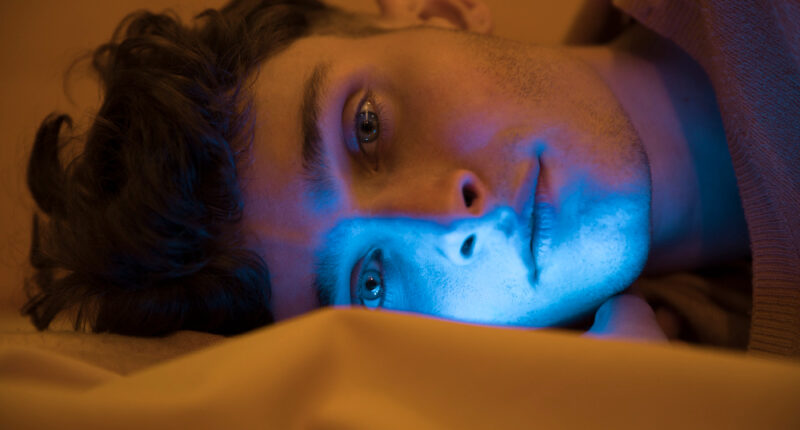In today’s digital world, blue light has become a significant part of our lives, thanks to devices like smartphones, tablets, computers, and LED lights. While blue light is essential for our bodies during the day, it can have a disruptive effect on our sleep if we’re overexposed to it at night. This article explores the science behind blue light, how it impacts sleep, and practical ways to minimize its effects to ensure restful sleep.
What is Blue Light?
Blue light is a type of high-energy visible (HEV) light with a wavelength ranging from 380 to 500 nanometers. It’s present naturally in sunlight and plays a vital role in regulating our circadian rhythm—the body’s internal clock that controls sleep-wake cycles. Exposure to blue light during daylight hours boosts alertness, improves mood, and helps cognitive function. However, exposure to blue light in the evening can send mixed signals to the brain, disrupting sleep patterns and affecting overall health.
How Blue Light Affects Sleep
- Suppresses Melatonin Production Melatonin is a hormone produced by the pineal gland in the brain that regulates sleep. Naturally, melatonin levels rise in the evening, signalling the body that it’s time to sleep. However, exposure to blue light, especially from electronic devices, can suppress melatonin production, delaying sleep onset and reducing sleep quality. Studies show that even small amounts of blue light exposure before bedtime can delay melatonin release by up to three hours.
- Disrupts Circadian Rhythm Our circadian rhythm is influenced by light exposure, especially blue light. When you use electronic devices at night, the body gets tricked into thinking it’s still daytime, delaying the production of melatonin. This disruption can lead to a misaligned sleep schedule, making it harder to fall asleep and stay asleep. Consistent interference with your circadian rhythm can lead to long-term sleep disorders, including insomnia.
- Reduces Sleep Quality and REM Sleep Blue light exposure at night affects the quality of your sleep by reducing the time you spend in restorative sleep stages, such as rapid eye movement (REM) sleep. REM sleep is essential for memory consolidation and emotional regulation. Without enough REM sleep, you might wake up feeling tired, irritable, and unfocused.
- Increases Alertness and Delays Sleep Onset Blue light boosts alertness and delays the body’s natural preparation for sleep, including the relaxation and lowering of core temperature. This makes it difficult to wind down and enter the early stages of sleep, leading to a longer time to fall asleep. Prolonged screen time at night can intensify this effect, making it challenging to feel sleepy at a reasonable hour.

Practical Tips to Minimize Blue Light Exposure
- Limit Screen Time in the Evening Reducing screen exposure at least one to two hours before bed can help your body transition to sleep mode. This break allows melatonin levels to rise naturally, promoting a more restful sleep.
- Use Blue Light Filters Many smartphones, computers, and tablets come with blue light filtering options, such as Night Shift (iOS) or Night Light (Android and Windows). These filters reduce blue light emission, giving your screen a warmer tone that is less likely to interfere with melatonin production.
- Consider Blue Light-Blocking Glasses Blue light-blocking glasses have special lenses that filter out blue light. Wearing these glasses in the evening or during late-night screen use can help reduce the amount of blue light reaching your eyes, protecting your sleep quality.
- Opt for Warmer Lighting at Night Use warm, dim lighting in the evening rather than bright, cool lights. Avoid LED lights that emit high amounts of blue light, and instead choose incandescent or low-blue light options to help your body prepare for sleep.
- Take Screen Breaks Throughout the Day Taking regular breaks from screens during the day helps reduce the cumulative exposure to blue light, reducing the overall strain on your eyes and minimizing the impact on your sleep at night.
- Spend Time Outdoors During Daylight Hours Natural sunlight exposure during the day strengthens your circadian rhythm, making it easier for your body to recognize when it’s time to wind down in the evening. This helps balance the effects of blue light exposure from screens and can lead to better sleep quality at night.
- Make Your Bedroom a Screen-Free Zone Creating a screen-free sleep environment eliminates the temptation of late-night scrolling or watching shows in bed, allowing your body and mind to associate your bedroom with rest rather than alertness.
Final Thoughts
Blue light has both benefits and drawbacks. While it’s a valuable source of energy and alertness during the day, too much exposure in the evening can significantly disrupt sleep patterns. By taking proactive steps to reduce blue light exposure, especially close to bedtime, you can improve your sleep quality, protect your circadian rhythm, and enjoy a more restful night’s sleep. Small adjustments like limiting screen time, using blue light filters, and creating a sleep-friendly environment can make a big difference in your overall well-being.









